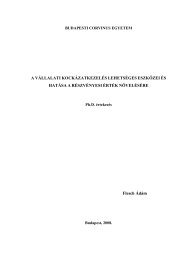Jenei István
Jenei István
Jenei István
Create successful ePaper yourself
Turn your PDF publications into a flip-book with our unique Google optimized e-Paper software.
<strong>István</strong> <strong>Jenei</strong>: Lean transformation of hospital processes – Structuring foreign and Hungarian experiences,<br />
PhD Dissertation, Corvinus University of Budapest, Doctoral School in Business Administration<br />
To do this the skills of nurses and doctors would need to be broadened (in contrast<br />
to the narrow deepening of skills encouraged by the current system) so that a smaller<br />
team of more broadly skilled people can solve most patient problems. At the same time,<br />
the tools of medicine – machines, labs, and record-keeping units – would need to be<br />
rethought and “right-sized” so that they are smaller, more flexible, and faster, with full<br />
complement of tools dedicated to every treatment team.<br />
Finally, the “patient” would need to be actively involved in the process and up-<br />
skilled – made a member of the team – so that many problems can be solved through<br />
prevention or addressed from home without need to physically visit the medical system,<br />
and so that visits can be better predicted.<br />
Over the time, it will surely be possible to transfer some of the equipment to the<br />
home as well, through teleconferencing, remote sensing, and even a home laboratory,<br />
the same way most of us now have a complete complement of office equipment in our<br />
home offices.<br />
What would happen if lean thinking was introduced as a fundamental principle of<br />
health care?<br />
The time and steps needed to solve problem should fall dramatically. The quality<br />
of care should improve because less information would be lost in handoffs to the next<br />
specialist, fewer mistakes would be made, less elaborate information tracking and<br />
scheduling systems would be required. The cost of each “cure” and of the total system<br />
could fall substantially.<br />
The problem of cures beyond our current knowledge would remain and the<br />
proposed lean transformation in health care is not directly helpful here. However, the<br />
lean transition could free up substantial resources which could be used for fundamental<br />
research to find new cures.<br />
(Womack-Jones, 1996, pp. 289-290.)<br />
The underlying logic of lean health care is clear: as in the motorcar industry, a series of<br />
processes must be implemented for the organisation to attain its goal. “Lean thinking<br />
concepts encourage health care providers to think about the patient’s journey from<br />
- 29 -

















